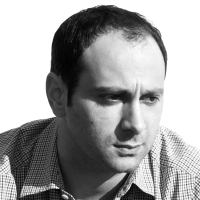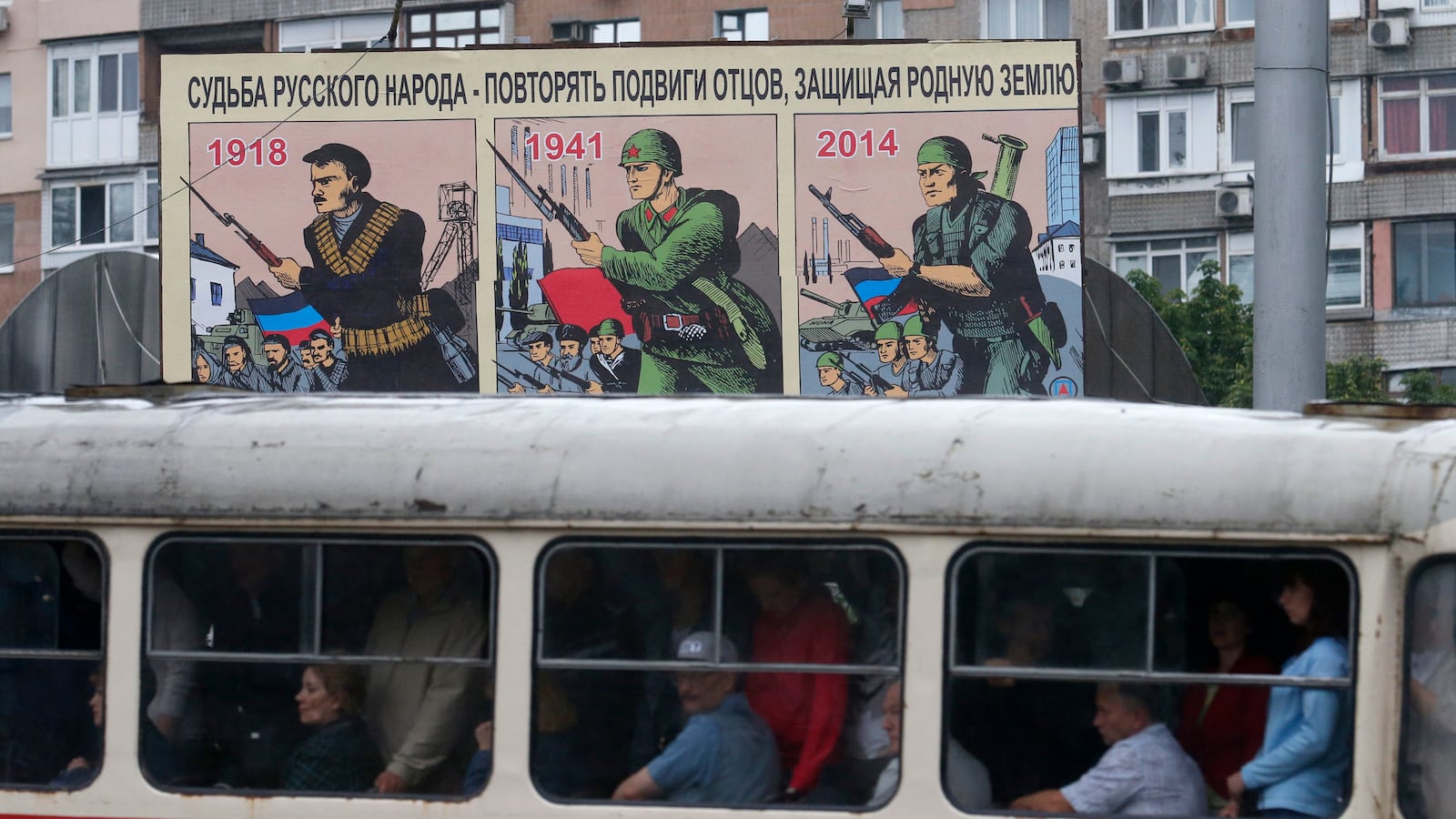DONETSK, Ukraine — They call it the “authority bra”: The push-up undergament worn by a certain type of female official in the more Soviet parts of Eastern Europe is not about sex but power—and it works. (Try standing up to officialdom with that amount of cleavage brandished at you.) It’s a popular look in Donetsk and was worn like a flak jacket by the formidable ticket collector who ushered me off the train at the central station of city waiting for a siege. Kiev was a world away.
I arrived on Saturday, July 5, and the city of Donetsk in eastern Ukraine, the headquarters of the self-proclaimed “People’s Republic of Donetsk” (DNR), had gone into lockdown. Following Ukraine President Petro Poroshenko’s June 30 announcement of the end of a unilateral ceasefire between the government and pro-Russia separatists, news was coming through that the Ukrainian army had pushed DNR forces out of the nearby town of Slavyansk after three months of heavy fighting.
The city streets were almost empty. Nobody was enjoying the weekend sunshine. Outside DNR headquarters, the city’s occupied central administration building, several bored-looking, tattooed militia guarding the entrance fiddled listlessly with their Kalashnikovs.
Since pro-Russia separatists took control of the city three months ago all journalists need official accreditation from the DNR press office to work in the city. After a cursory search of my bag I entered the building. Months of occupation have not been kind and rubbish is strewn across the entrance hall. Taped to the wall is an exasperated sign: “Don’t be a pig. Clean up after yourself.”
The press office is housed on the fifth floor and run by Claudia, an efficient woman who is trying her best to arrange my accreditation and organize interviews with DNR officials. Information on the situation, she explains, is scarce. What is clear is that several thousand DNR fighters led by Igor Strelkov (the head of the Donbass people’s militia) have left Slavyansk in convoy and are, she says, on their way to Donetsk, though she has no idea where they are now or when they will arrive. The original plan was to go to Kramatorsk but, she says, it seems the Ukrainian army has captured that town, too.
Everyone in the office seems aware that the conflict may just have entered its end game and people are discussing worst-case scenarios. Just in front of Claudia’s desk sit two men in their early 20s—one with tousled dark hair and a slack jaw, and a dirty blond with a partial squint. Their functions remain unclear. “What’s the drill if all electronic communications are cut?” says dark-hair. “We use birds, right?” His friend grunts in agreement. “What were they again?” he continues. “Chickens, swans?”
“Carrier pigeons,” comes the reply.
Claudia’s efforts eventually yield Andrei Purgin, one of the founding members of the DNR. He is equally unclear about the situation. “I’m not a military man,” he replies dismissively when I ask him what happened in Slavyansk. But he is clear on one thing: The DNR will fight on; there will be no negotiations with the “murderers” from Kiev, he says.
Donetsk is now a city in confusion. News sources are contradictory and no effective municipal governance exists to provide people with the information they need. The deputy mayor’s maternal secretary sums up the ubiquitous uncertainty and fear: “Last night I was in my living room when I heard loud bangs,” she says. “I couldn’t work out what they were. They didn’t sound like gunshots or artillery fire (I’m used to both now) so I decided to go out onto my balcony and take a look—and saw that it was my neighbour beating her carpet.”
By Sunday morning, things have worsened inside the building. Claudia is back at work, this time with her son, a sweet-looking blond boy of around 6 who is playing with a toy gun: “Bang-bang!” he squeals delightedly. But she seems to be making plans to leave. Though where exactly is unclear: “Somewhere far away from here,” is all she will say.
I manage to get an interview with one of the most prominent separatists, Pavel Gubarev, the “People’s Governor of Donetsk,” and meet him in an office compound near the city center, where he is determined to justify the fall of Slavyansk. Citing Russian General, Mikhail Kutuzov’s 1812 abandonment of Moscow in the face of Napoleon’s advance, he tells me that everything is going well: “If you study history of wars in Russia,” he tells me, “you will see that when Russians retreat, victory is near.”
And what about the Ukrainian army’s seizure of Kramatorsk? I ask. “There are going to be some surprises for the army in Kramatorsk, but that’s a military secret,” he replies evenly.
The rhetoric is clear: Partisan warfare is coming “in the cities, in the forests, on the roads and…in the rear of the enemy—throughout the whole region of Novorussia,” according to Gubarev. “If Donetsk is blockaded the humanitarian situation will be 10 times worse than in Slavyansk,” he continues. “And the Ukrainian artillery will have to shell Ukraine’s—sorry, the former Ukraine’s—premier industrial city.”
He’s right. If the Ukraine army visits the same level of destruction on Donetsk that it did on Slavyansk (which has created tens of thousands of refugees) the cost—both humanitarian and political—will be catastrophic.
Outside, after the interview ends, a militia commander is laying into his men about the compound’s lax security. “Look at all these open windows,” he berates his sheepish-looking underlings. “We are sitting ducks!” Gesturing to the street, he becomes even more agitated: “And move those cars out of the way. We can’t see what’s coming!”
The city is now bracing for imminent conflict. Fighters have been pouring in from Slavyansk and the previously empty streets are now filled with armed militia idling on corners and drinking beer in cafes. Some question people in the local market.
On Monday afternoon I pay a visit to a city official at the barracks of the Vostok battalion, the DNR’s most effective fighting force. The barracks is a squat building surrounded by sandbags on a side street near the city center. In the garden several militia, all in their early 20s, look out across the street—they are on high alert. One particularly excitable guard practices drawing his pistol, making whooshing sounds each time he draws and shoots an imaginary enemy. A couple more peer through spy holes in the sandbag barricades that line the perimeter. Resting casually nearby, within arm’s reach, is a pile of dynamite.
The separatists’ vows to “fight to the end” may in the end prove to be mere rhetoric, but it is clear that right now they are preparing to resist. Ukraine’s recent military success will understandably be welcomed by Kiev, but it must be accompanied by political action. The situation remains uncertain but the prospect of tragedy is very real. And if it comes to Donetsk, it will be on a scale as yet unseen in this crisis.





